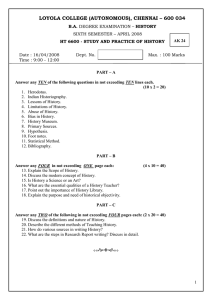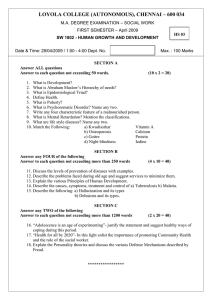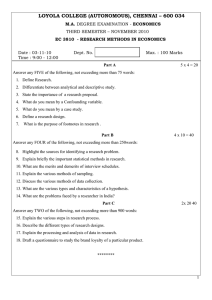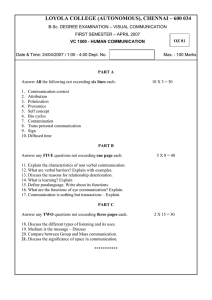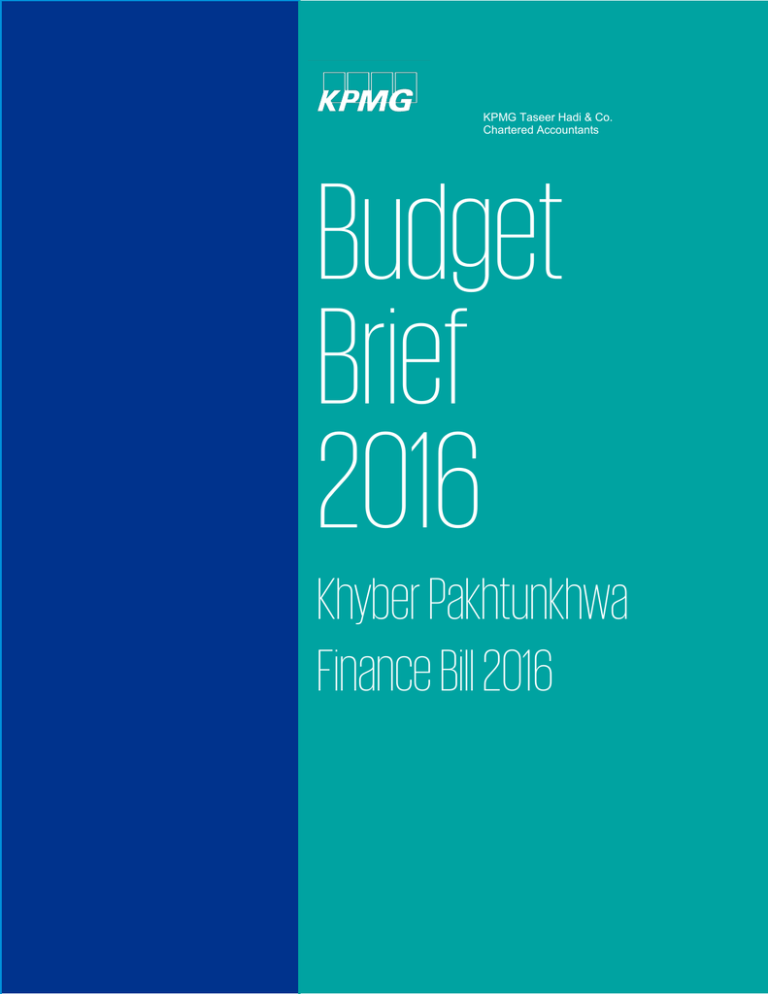
KPMG Taseer Hadi & Co.
Chartered Accountants
Budget
Brief
2016
Khyber Pakhtunkhwa
Finance Bil 2016
This Budget Brief 2016 contains
amendments of Khyber
Pakhtunkhwa Finance Bill 2016
as it relates to Khyber
Pakhtunkhwa Finance Act, 2013;
Stamp Act, 1899; West Pakistan
Urban Immovable Property Tax
Act, 1958; West Pakistan Motor
Vehicles Taxation Act, 1958;
West Pakistan Act, 1964; West
Pakistan Motor Vehicles
Ordinance, 1965; Khyber
Pakhtunkhwa Finance Act, 1990;
and Khyber Pakhtunkhwa Local
Government Act, 2013.
The provisions of the Khyber
Pakhtunkhwa Finance Bill 2016
are generally applicable from 01
July 2016, unless otherwise
specified.
This Memorandum contains the
comments, which represent our
interpretation of the legislation,
and we recommend that while
considering their application to
any particular case, reference be
made to the specific wordings of
the relevant statutes.
15 June 2016
Contents
Contents
Khyber Pakhtunkhwa Finance Act, 2013
1
Stamp Act, 1899
2
West Pakistan Urban Immovable Property Tax Act, 1958
3
West Pakistan Motor Vehicles Taxation Act, 1958
4
West Pakistan Finance Act, 1964
6
West Pakistan Motor Vehicles Ordinance, 1965
7
Khyber Pakhtunkhwa Finance Act, 1990
8
Khyber Pakhtunkhwa Local Government Act, 2013
9
Khyber Pakhtunkhwa Finance Act,
2013
Registration
Section 41
The Bill proposes an editorial change in section 41(3) of
the Act according to which a resident person receiving
taxable services from a non-resident person in terms of
section 19(2) of the Act is to be treated as a registered
person for the purposes of the tax period in which the
resident person receives the services, or the invoice is
sent by the non-resident person or consideration is paid,
whichever is earlier.
Appointment of Officers
means that the taxpayer or the officer not below the rank
of an Additional Collector may, in addition to the order of
the Collector (Appeals) and order under section 79(4) of
the Act, challenge in appeal the order of the Collector or
the Authority directly before the Appellant Tribunal.
Power to make regulations
Section 114
The Bill seeks to restrict requirement for the Authority to
seek approval from the Council to make regulations or
specify procedures, not inconsistent with the rules to give
effect to the purposes of the Act only to the extent where
the relevant provisions of the Act specifically provides for
such approval to be obtained.
Section 56
The Bill proposes to substitute the requirement for the
Authority to frame regulations to define powers,
pecuniary and territorial jurisdiction of officers. It is
proposed that the officers are to exercise powers and
discharge duties in the manner conferred upon them
under the Act and regulations made thereunder. The
Authority is empowered to impose limitations, restrictions
or conditions to discharge powers and duties by the
officers through passing of a general or a special order.
Delegation of Powers
Classification of new services under the First
Schedule
The following new services are proposed to be inserted
in the First Schedule to the Act:
9803.3000
Facilities for travel by road
9804.3000
Cargo services by road
9815.8000
Visa processing services including
advisory or consultancy services for
foreign education or for migration
9876.0000
Valuation services including competency
and eligibility testing services
Section 56-A
A new section is proposed to be inserted, which
prescribes that powers of a senior officer could be
exercised or performed by a junior officer, subject to
specified conditions and limitations imposed by the
Authority. This proposal seems to cater to shortage of
officers available with the Authority. Presumably, even
the powers of the Collector (Appeals) could be exercised
by an Additional Collector.
Appeal to the Appellant Tribunal
Section 84
The Bill seeks to include order passed by the Collector or
Authority under any of the provisions of the Act as an
appealable order before the Appellant Tribunal. This
1
Stamp Duty
The Bill proposes to increase stamp duties under the
Stamp Act, 1899 as follows:
•
•
Article 4
- from Rs. 60 to Rs. 100 in case of
Affidavits.
Article 6(A) - from Rs, 200 to Rs. 300 per Marla in
case of allotment of residential open
plots.
- from Rs. 400 to Rs. 600 per Marla in
case of allotment of commercial open
plots.
•
Article 8(A) - from Rs. 150 to Rs. 300 for arms
licenses of non-prohibited bore
- from Rs. 1,000 to Rs. 1,500 for arms
licenses of prohibited bore
- from Rs. 2,500 to Rs. 5,000 for form X
and form XII prescribed under the Arms
Rules
• Article 48
- Increase from Rs.300 to Rs.600 and
from Rs.900 to Rs.1,500 for various
types of ‘Power of Attorney’
2
West Pakistan Urban Immovable
Property Tax Act, 1958
The Bill proposes to amend the West Pakistan Urban
Immoveable Property Act, 1958 which imposes tax on
immoveable properties in urban areas. The proposal is to
insert a new clause (c-i) after clause (c) at S.No.3 of
Schedule-II to the Property Act to categorize a
commercial area as ‘C locality’ and give it a weightage of
‘Five’. Presently, however ‘C locality’ is also categorized
in ‘Clause (d)’ of the said Schedule.
3
West Pakistan Motor Vehicles
Taxation Act, 1958
3
The Bill proposes to amend the West Pakistan Motor
Vehicles Taxation Act, 1958 by substituting Schedule-II
to the Motor Vehicles Act tax as follows:
S
#
Schedule – II
(see section 3)
Description of Motor Vehicles
1
Motor cycle/ Scooter
2
Truck/Trailers/Delivery Vans used
for the transport or haulage of
goods or materials:-For life time
Vehicles plying for hire and
ordinarily used for transport of
passengers:
(a) mechanically propelled
tricycle/rickshaw with seating
capacity of not more than three
persons;
Annual
Rate of
Tax
Rs.1500
for life
time
(a) Vehicles not exceeding 1250
K.G. in unladed weight;
Rs. 625
(b) Vehicles with maximum laden
capacity upto 2030 KG:
Rs. 1,000
(c) Vehicles with maximum laden
capacity exceeding 2030 KG
but not exceeding 4060 KG;
Rs. 1,025
(d) Vehicle with maximum laden
capacity 4060 KG but not
exceeding 6090 KG;
Rs. 2,200
(e) Vehicles with maximum laden
capacity exceeding 6090 KG
but not exceeding 8120 KG;
Rs. 2,500
(f) Vehicles with maximum laden
capacity exceeding 8120 KG
but not exceeding 12000 KG;
Rs. 5,000
(g) Vehicles with long Trailers or
other vehicles with maximum
laden capacity exceeding 12000
KG but not exceeding 16000
KG; and
Rs. 7,500
(h) Vehicles with long trailers or
other vehicles with maximum
laden capacity exceeding 16000
KG.
Rs. 10,000
(b) other vehicles with seating
capacity of (i) not more than 4 persons;
(ii) more than 4, but not more
than 6 persons; and
(iii) More than 6 persons,
plying on a routes.
4
Rs.500
Rs. 750
Rs. 800
Rs. 225
per seat
( c) motor vehicles with seating
capacity of more than 6 but not
more than 20 persons, plying,
exclusively within the limits of
Corporation/Municipality or
Cantonment.
Rs. 200
per seat
( d) motor vehicles with seating
capacity of more than 6 but not
more than 20 persons plying
exclusively within the limits of
Corporation, Municipality or
Cantonment or partly within and
partly outside such limits with
sixty percent of the total length
of the route failing within the
limits of a Corporation,
Municipality or Cantonment.
Motor vehicles (Private Motor
Cars/Jeeps, etc.) other than those
mentioned above and having-
Rs. 150
per seat
(a) seating capacity of not more
than 3 persons;
Rs. 625
(b) Seating capacity of more than 3
but not more than 6
persons.
(i) with engine power not
exceeding 1000cc a lump
sum tax of rupees ten
thousand shall be charged
for motorcars and jeeps up
4
to 1000 cc at the time of
registration:
Provided that in case of a
motor vehicle registered
before 1" day of July 2015,
the amount of tax already
paid shall be deducted from
the payable tax of rupees
ten thousand and the
remaining amount shall be
paid lump sum at the time
of payment of the tax due;
and
(ii) with engine power
exceeding 1000 cc but not
exceeding 1300 cc;
5
Rs. 1,500
(iii) with engine power
exceeding 1300cc but not
exceeding 1500 cc;
Rs. 2,250
(iv) (a) with engine power
exceeding 1500 cc but
not exceeding 2500 cc;
and
(b) Luxury Vehicles; and
Rs. 3,500
(v) with engine power
exceeding 2500 cc; and
Rs. 6,500
(c) seating capacity of more than 6
persons.
Rs. 1000
per seat
All tractors with or without trailers.
Rs. 800
5
West Pakistan Finance Act, 1964
The Bill proposes to amend the West Pakistan Finance
Act, 1964 so as to impose electricity duty on energy
supplied by a licensee to consumers, by substituting the
Fifth Schedule to the Finance Act as follows:
Appendix-II
Fifth Schedule
(see section 13)
In case of energy supplied Electricity duty on the
by a licensee to consumer
amount of the variable
of any of the following
charges or the supply
categories:
charges worked out
according to electricity
tariff:
(a) Domestic;
1.5 percent
(b) Commercial;
1.5 percent
(c) Industrial undertakings; 1.0 percent
(d) Tube wells for irrigation 1.0 percent
and agricultural
machinery; and
(e) Premises where the
1.5 percent
supply of energy by a
licensee is un-metered.
EXPLANATION-I: Electricity tariff' means the schedule
of tariff as made and notified by the Federal Government
under sub-section (4) of section 31 of the Regulation of
Generation, Transmission and Distribution of Electric
Power Act, 1997.
EXPLANATION-II: Supply charges and variable charges
are sale rate per kilowatt hour as a single rate or part of a
two part tariff applicable to actual unit consumed by the
consumer.
EXPLANATION-III: Premises which are used wholly or
principally for manufacturing process within the meaning
of clause (k) of section 2 of the Khyber Pakhtunkhwa
Factories Act, 2013 (Khyber Pakhtunkhwa Act No. XVI of
2013) shall be deemed to be used for an industrial
undertaking.
6
West Pakistan Motor Vehicles
Ordinance, 1965
The Bill proposes to make certain amendments in the
West Pakistan Motor Vehicles Ordinance, 1965 in
relation to vehicles registration marks, number plates,
and other registration documents as to be notified in the
official Gazette by the Provincial Government.
7
Khyber Pakhtunkhwa Finance Act,
1990
The Bill proposes to levy tax on ‘Association of Persons’
and ‘Individual Firms’ engaged in profession, trade,
calling or employment in the Province on the basis of
their capital and reserves. By doing so the intention is to
tax ‘Association of Persons’ and ‘Individual Firms’ on
similar basis as in case of limited liability companies.
Paid Capital or Paid Capital and
reserves
(a) When not exceeding Rs. 10
million
(b) When exceeding Rs. 10 million
but not exceeding Rs. 25
million
(c) When exceeding Rs. 25 million
but not exceeding Rs. 50
million
(d) When exceeding Rs. 50 million
but not exceeding Rs. 100
million
(e) When exceeding Rs. 100
million but not exceeding
Rs.200 million
(f) When exceeding Rs. 200
million.
Rate of tax
Rs. 10,000
Rs. 15,000
Rs. 20,000
Rs. 50,000
Rs. 75,000
Rs. 100,000
Explanation: the paid up capital in
case of foreign banks shall be
minimum paid up capital as
determined by the State Bank of
Pakistan.
8
Khyber Pakhtunkhwa Local
Government Act, 2013
Consequent to establishment of local Councils, the Bill
seeks to omit the words ‘in lieu of Octroi and Zilla Tax’ for
the purpose of recommendations to be made by the
Finance Commission to the Provincial Government on
the amount of grants for local government as mentioned
under clause (a) of section 53 (1) of the Khyber
Pakhtunkhwa Local Government Act, 2013.
9
a
Offices in Pakistan
Karachi Office
Sheikh Sultan Trust Building No. 2
Beaumont Road
Karachi 75300
Phone +92 (21) 3568 5847
Fax
+92 (21) 3568 5095
eMail karachi@kpmg.com
Lahore Office
2nd Floor, Servis House
2-Main Gulberg, Jail Road
Lahore 54000
Phone +92 (42) 3579 0901-6
Fax
+92 (42) 3579 0907
eMail lahore@kpmg.com
Islamabad Office
Sixth Floor, State Life Building
Blue Area
Islamabad
Phone +92 (51) 282 3558
Fax
+92 (51) 282 2671
eMail islamabad@kpmg.com
www.kpmg.com.pk
© 2016 KPMG Taseer Hadi & Co., a Partnership firm registered in Pakistan and a member
firm of the KPMG network of independent member firms affiliated with KPMG International
Cooperative (“KPMG International”), a Swiss entity. All rights reserved.
The information contained herein is of a general nature and is not intended to address the
circumstances of any particular individual or entity. Although we endeavour to provide
accurate and timely information, there can be no guarantee that such information is
accurate as of the date it is received or that it will continue to be accurate in the future. No
one should act on such information without appropriate professional advice after a thorough
examination of the particular situation.
The KPMG name and logo are registered trademarks or trademarks of KPMG International.



